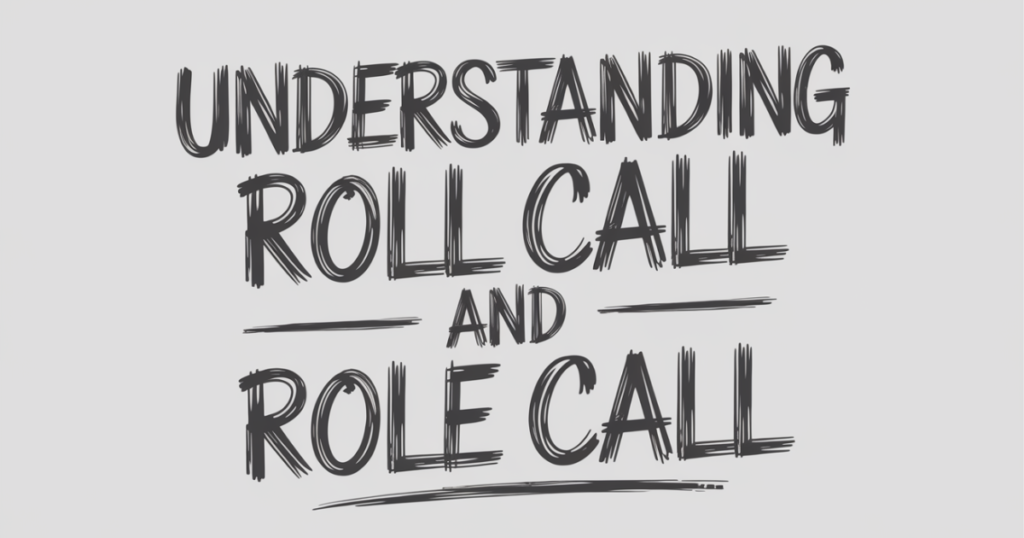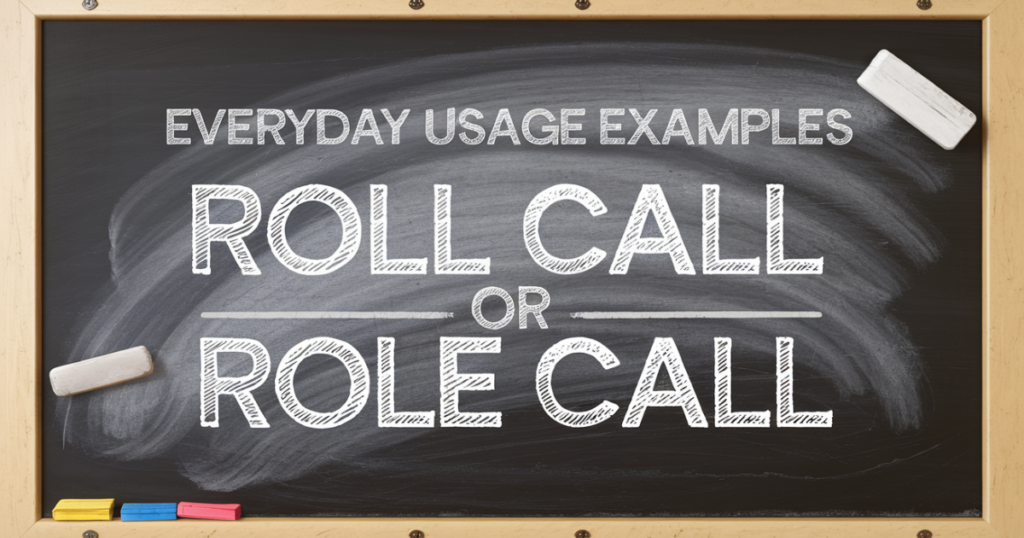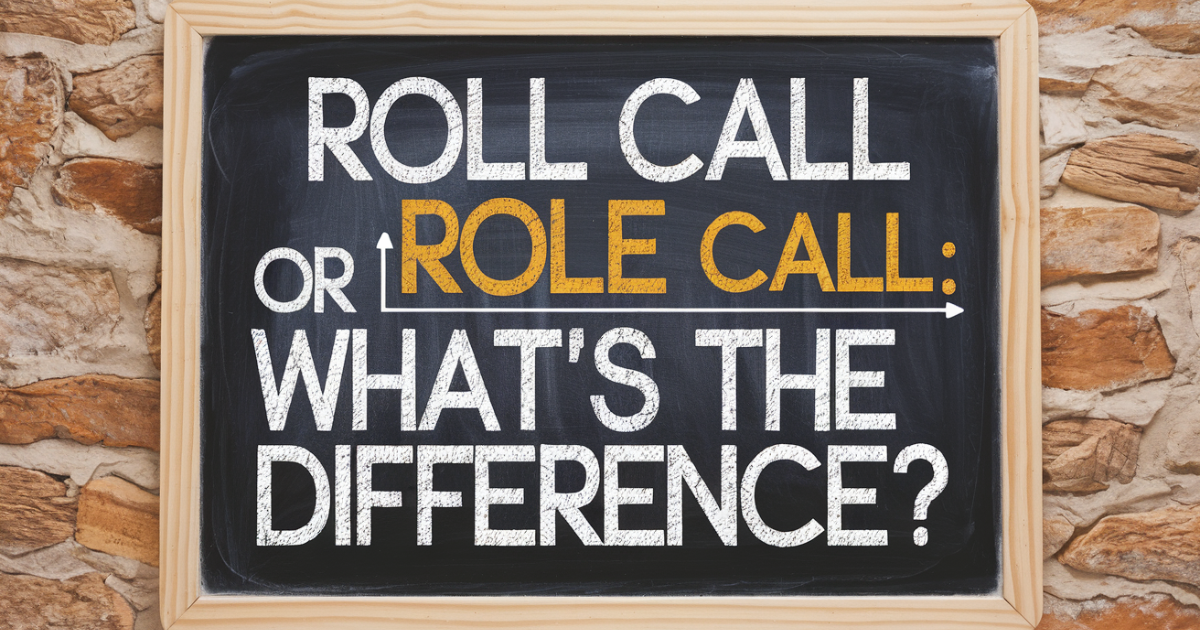When hearing the phrases roll call or role call, they might sound identical, but they have distinct meanings and uses. Understanding the difference between these terms is essential, especially in settings where both may be relevant. Roll call refers to the process of reading names in a list to check attendance, commonly seen in classrooms, meetings, or formal gatherings.
In both spoken and written language, knowing the difference between roll call and role call can prevent misunderstandings. While roll call is the correct term for taking attendance or verifying presence, role call mistakenly applies when discussing individual responsibilities or roles. Let’s dive deeper into how these terms differ and when to use each correctly.
Understanding Roll Call and Role Call

Roll Call: Definition and Usage
Roll call is the act of reading names from a list to confirm attendance in a group or gathering. This process is common in settings like schools, meetings, and formal events to verify who is present. It helps maintain organization and accountability within groups.
In a classroom: the teacher often conducts roll call at the beginning of each class to ensure all students are present and ready to learn.
In the military: roll call is conducted at the start of each day to ensure all personnel are accounted for and ready for duty.
Role Call: Definition and Usage
Role call is a term often mistakenly used in place of roll call. It typically refers to the act of identifying or calling out the roles or responsibilities assigned to individuals in a group.
While not a standard term, it can imply a review of who is responsible for specific tasks in a meeting or organization. Understanding the distinction helps clarify communication in various settings.
In theater: role call is used during rehearsals to confirm which actors are present for their specific characters and scenes.
In the workplace: role call can occur during team meetings to identify which employees are responsible for specific projects or tasks.
You Also Like To Read This: Leafs or Leaves? Which Form To Use?
Side-by-Side Comparison
Here’s the updated side-by-side comparison table with an additional key difference:
| Aspect | Roll Call | Role Call |
| Definition | Reading names from a list to confirm attendance | Identifying assigned roles or responsibilities |
| Common Usage | Schools, meetings, military | Team meetings, rehearsals |
| Purpose | To check who is present | To clarify responsibilities |
| Correctness | Standard and widely accepted | Often used incorrectly in place of roll call |
| Key Difference | Focuses on attendance | Focuses on duties and tasks |
Roll call is primarily about confirming attendance and is commonly used in educational and formal settings to ensure everyone is present. In contrast, role call focuses on identifying specific roles or responsibilities within a team or group.
While roll call is the correct term, role call can sometimes appear in discussions about duties, leading to confusion. Knowing the difference enhances communication and reduces misunderstandings in various contexts.
Everyday Usage Examples

Roll Call Examples
- School Setting: The teacher called out names during roll call to check which students were present for the day’s lesson.
- Meeting: Before the board meeting began, the secretary performed a roll call to ensure that all members were in attendance.
- Military: The sergeant conducted a roll call in the morning to account for all soldiers before heading out on their mission.
- Field Trip: During the field trip, the chaperone did a roll call to confirm that all students were accounted for before boarding the bus.
Role Call Examples
- Theater Production: During rehearsals, the director called a role call to confirm which actors were available to play their assigned characters.
- Team Meeting: The manager performed a role call at the start of the meeting to identify who was responsible for each project update.
- Project Kickoff: In the project kickoff meeting, the team leader conducted a role call to outline each member’s responsibilities for the project.
- Event Planning: During the event planning session, the organizer held a role call to clarify who was in charge of catering, decorations, and logistics.
FAQs
Is it role call or roll call?
It is roll call, which refers to the process of taking attendance by reading names from a list.
What is the difference between role and roll?
Role refers to a specific function or position someone holds, while roll refers to a list of names or a process of attendance.
What does call the role mean?
“Call the role” is often a mistaken phrase for roll call, typically meaning to check who is present or to identify assigned responsibilities.
What is roll calls in a job?
Roll calls in a job refer to a practice of checking attendance or confirming who is present for meetings or shifts, ensuring accountability among employees.
Conclusion
In conclusion, understanding the difference between roll call and role call is essential for clear communication. Roll call is a widely accepted term used to confirm attendance in various settings, such as schools and meetings. In contrast, role call is often misused, referring to the identification of assigned roles or responsibilities.
This distinction helps prevent confusion in discussions about attendance and duties. Whether in educational, military, or workplace environments, using the correct terminology fosters clarity and organization. Overall, knowing these terms enhances effective communication and ensures everyone is on the same page.

Grammerlytips.com, authored by Jame, offers expert tips and insights on mastering grammar, enhancing writing skills, and boosting communication effectiveness.

